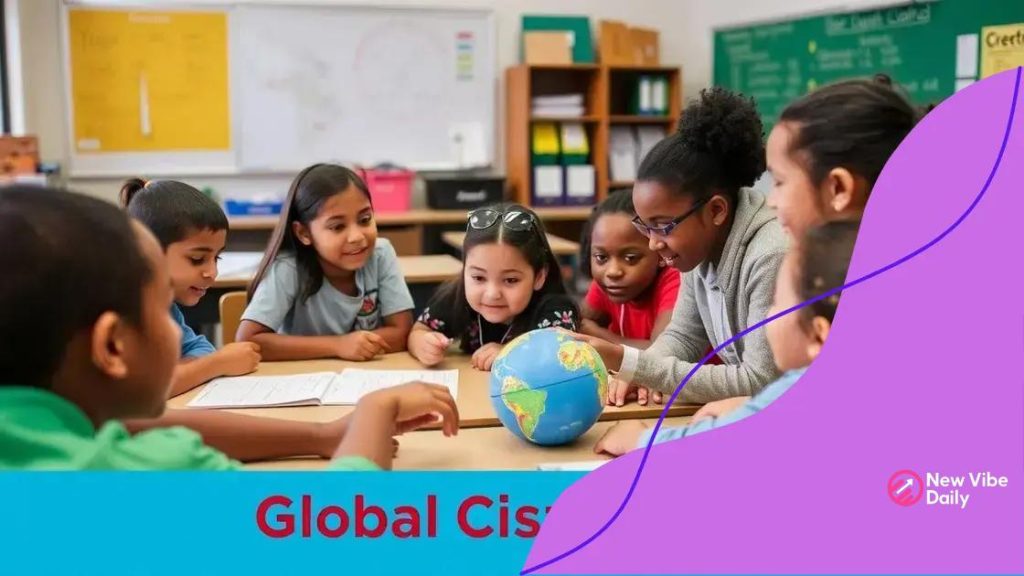Promoting global citizenship through education: why it matters

Promoting global citizenship through education equips students with the awareness and skills necessary to engage responsibly in a diverse and interconnected world, addressing both local and global challenges.
Promoting global citizenship through education opens up new horizons for students, encouraging them to engage with diverse cultures and perspectives. Have you ever wondered how education shapes responsible global citizens? Let’s dive into this important topic.
Defining global citizenship
Defining global citizenship is an essential step in fostering a more tolerant and interconnected world. At its core, global citizenship means understanding that we are all part of a larger human community, regardless of borders. This concept encourages us to act responsibly and ethically in our interactions with others around the world.
To truly embrace global citizenship, we need to recognize our roles and responsibilities. It’s about seeing beyond our local environments and acknowledging the global issues that affect us all. By understanding different cultures and perspectives, we can learn to collaborate and solve problems together.
Key Characteristics of Global Citizenship
- Awareness: Global citizens are informed about global challenges such as poverty, inequality, and climate change.
- Empathy: They show compassion and understanding towards people from diverse backgrounds.
- Engagement: They actively participate in initiatives that promote social justice and sustainability.
- Responsibility: They recognize their impact on the world and strive to make positive changes.
By integrating global citizenship into education, we help students develop a more profound awareness of their place in the world. This process involves questioning assumptions and exploring diverse viewpoints. It empowers learners to challenge injustices and advocate for change.
In the classroom, teaching about global citizenship can take various forms. Discussions about current events, project-based learning, and collaboration with international peers can enhance understanding and appreciation of global interconnections. Utilizing technology can further bridge gaps, allowing students to communicate and collaborate with others worldwide.
Ultimately, defining global citizenship is about nurturing a mindset that values diversity and interdependence. When individuals recognize their shared humanity, it paves the way for peace and mutual respect.
The role of education in nurturing citizenship
Education plays a vital role in nurturing citizenship as it shapes the values and knowledge of individuals. It serves as a foundation for understanding one’s responsibilities within a community and the world. When students learn about their rights and duties, they become more engaged and active in their societies.
Through education, students can gain awareness about social issues and global challenges. This type of awareness encourages critical thinking and civic participation. By discussing topics such as human rights, democracy, and sustainability, schools can motivate learners to become responsible global citizens.
Key Aspects of Education in Citizenship
- Critical Thinking: Educating students to analyze information helps them make informed decisions.
- Community Engagement: Schools that involve students in local projects foster a sense of responsibility.
- Diversity and Inclusion: Education promotes understanding and respect for different cultures.
- Skill Development: Learning collaboration and communication skills prepares students for teamwork in diverse environments.
Another essential aspect is the incorporation of global perspectives into the curriculum. Teaching foreign languages, history, and cultures encourages empathy and a broader worldview. Such an approach allows students to appreciate different viewpoints and recognize the interconnectedness of global issues.
Engaging activities, such as group projects and debates, can further enhance students’ learning experiences. These methods not only promote engagement but also help develop teamwork skills essential for active citizenship. Schools can invite local leaders or organizations to participate in discussions, giving students real-world insights.
In summary, the role of education in nurturing citizenship is profound. It not only equips students with knowledge but also inspires them to take action and create positive change in their communities.
Practical strategies for implementing global citizenship in schools

Implementing global citizenship in schools requires practical strategies that foster engagement and understanding. Schools can take various approaches to make this concept more tangible for students. Engaging students in projects that address community and global issues is a powerful start.
One effective strategy is incorporating service-learning into the curriculum. This method combines community service with instruction, allowing students to reflect on their experiences. They learn about social issues while actively contributing to their communities.
Ways to Foster Global Citizenship
- Cultural Exchange Programs: Allow students to connect with peers from different countries, enhancing their understanding of diverse cultures.
- Interdisciplinary Projects: Encourage collaboration across subjects to address global challenges, such as climate change or inequality.
- Technology Utilization: Use digital tools and platforms to connect students with global issues and discussions in real-time.
- Inviting Guest Speakers: Bring in community leaders or activists to share their experiences and insights about global citizenship.
Another important strategy is to promote awareness of global issues through discussions and activities. Teachers can facilitate debates on current events, allowing students to express their opinions and consider multiple perspectives. This not only sharpens critical thinking skills but also emphasizes the importance of being informed global citizens.
Additionally, integrating global citizenship themes into subjects like history, geography, and social studies can enhance students’ understanding. Teachers can frame lesson plans around the impact of historical events on current global relations, fostering a continuous connection between past and present.
Incorporating experiential learning opportunities, such as field trips to cultural events or international festivals, can also enrich the educational experience. These practical experiences allow students to witness and participate in global diversity firsthand, reinforcing the lessons taught in class.
Case studies of successful global citizenship programs
Exploring case studies of successful global citizenship programs helps us understand how different educational frameworks can cultivate responsible citizens. These examples demonstrate how effective strategies can be implemented in various school settings, encouraging students to engage with global issues.
One notable program is the International Baccalaureate (IB), which emphasizes global citizenship as a core component of its curriculum. Students participate in community service projects and develop international-mindedness through diverse course offerings. By encouraging critical thinking about world issues, IB programs foster active, compassionate global citizens.
Examples of Effective Programs
- The Global Schoolhouse: This initiative connects schools worldwide, facilitating collaborative online projects. Students share experiences, promote cultural awareness, and engage in discussions about global challenges.
- TeachUNICEF: A program by UNICEF that educates students on child rights and global issues. Schools use practical tools to encourage activism and community involvement among students.
- Peace Corps’ Global Citizen Program: This program allows educators to integrate service learning into their classrooms, helping students understand their role in promoting peace and development around the world.
- Model United Nations: Students simulate UN meetings, learning about diplomacy and global governance. This interactive activity enhances understanding of international relations and develops public speaking skills.
These case studies show that integrating global citizenship into education can significantly impact students. By participating in these programs, students develop a sense of responsibility towards their communities and the global society.
Moreover, these initiatives often involve partnerships with local organizations, further enriching the educational experience. Students are encouraged to reflect on their learning and the implications of their actions, which fosters deeper understanding and empathy.
Encouraging collaboration among schools, organizations, and communities enhances the effectiveness of these global citizenship programs. By sharing resources and ideas, schools can improve their approaches and inspire future generations to take on global challenges with confidence and compassion.
Challenges in promoting global citizenship
Promoting global citizenship in education is crucial, but it also comes with various challenges. One significant hurdle is the lack of resources and training for teachers. Many educators feel unprepared to teach global issues due to insufficient professional development opportunities.
Additionally, there may be resistance from parents and communities who might not fully understand the concept of global citizenship. Some believe it shifts the focus away from local issues or feels disconnected from their cultural context. This perception can hinder efforts to implement global citizenship initiatives effectively.
Common Challenges Faced
- Curriculum Limitations: Many schools may lack comprehensive curricula that emphasize global perspectives, making it challenging to integrate global citizenship education.
- Cultural Sensitivity: Addressing global issues can be sensitive, as differing cultural values may lead to misunderstandings and conflicts in the classroom.
- Assessment Methods: Evaluating students on their understanding of global citizenship is often difficult due to the lack of standardized testing in this area.
- Time Constraints: Teachers frequently have limited time to cover all required subjects, which can push global citizenship education to the margins of the curriculum.
Furthermore, balancing local priorities with a global perspective can be challenging. While communities want to address local issues, it is essential to highlight how these connect to larger global challenges. Educators must work diligently to make these connections clear to their students.
Another significant challenge is ensuring that global citizenship education is inclusive and representative of diverse voices. Programs that do not take into account different perspectives risk alienating students and not fostering genuine understanding.
Despite these challenges, many educators and organizations are finding innovative ways to promote global citizenship. Collaboration with local and international partners can provide valuable resources and support, enriching students’ learning experiences. Engaging students in dialogues about their communities and the world can encourage them to think critically about their roles as global citizens.
In conclusion, promoting global citizenship in education is vital for fostering understanding and responsibility among students. Despite facing challenges such as limited resources and curriculum constraints, schools can implement effective strategies and programs to nurture engaged, compassionate global citizens. By sharing successful case studies, we see how creativity and collaboration can help overcome these obstacles. As educators, parents, and communities work together, they can empower students to recognize their role in creating a better world for all. Ultimately, the journey toward global citizenship is ongoing, and each step taken contributes to a more connected, understanding, and peaceful society.
FAQ – Frequently Asked Questions about Promoting Global Citizenship through Education
What is global citizenship?
Global citizenship is the idea that individuals are part of a larger world community and have responsibilities towards it.
Why is it important to teach global citizenship?
Teaching global citizenship helps students understand cultural diversity, social justice, and their roles as responsible citizens on a global scale.
What are some challenges in promoting global citizenship in schools?
Challenges include limited resources, curriculum constraints, and resistance from parents who may not fully understand the concept.
What strategies can schools use to implement global citizenship education?
Schools can integrate service learning, collaborate with international partners, and engage students in discussions about global issues to promote global citizenship.






